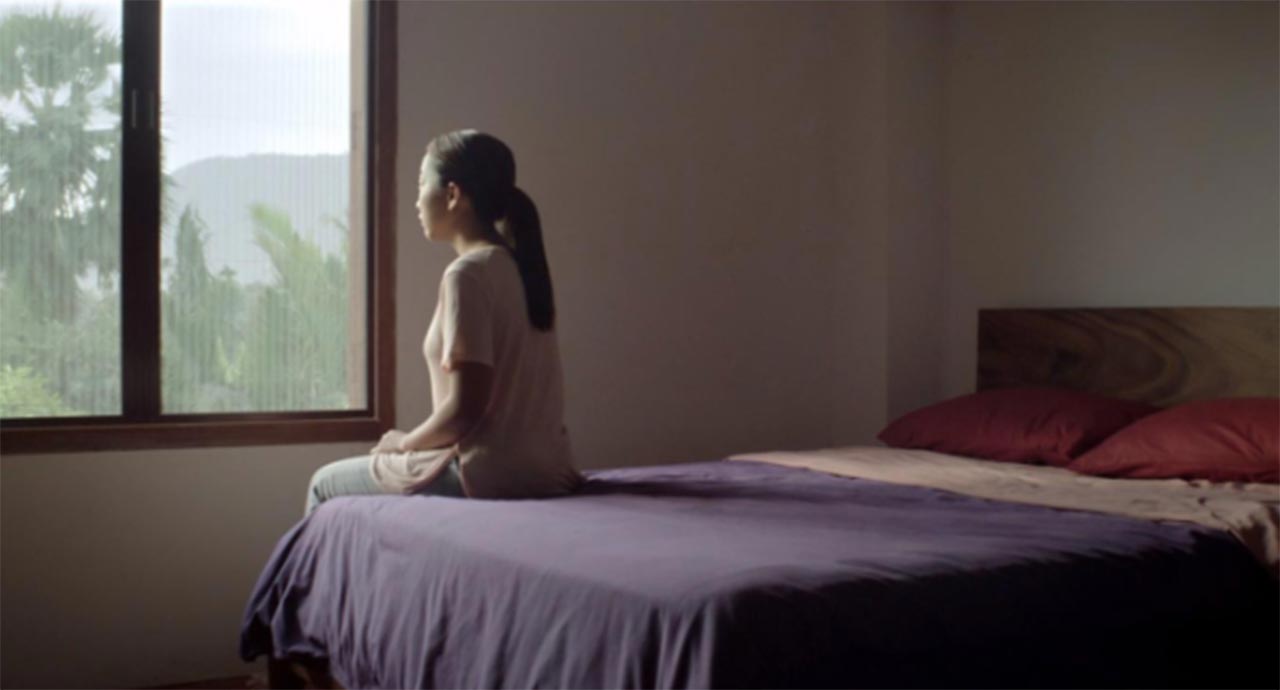Reclaiming the Personal
The quotes in this article are extracts from an email interview with Danech San, director of A Million Years.
Viewing Southeast Asian short films may sometimes seem like an onscreen search for the political amongst personal stories. For one, the label of Southeast Asia doesn’t clarify much beyond ten possible, loosely-linked places of origin (in fact, this year’s films boast thirteen). In response to this ambiguity, we might resort to scouring within frames, siphoning out traces of territoriality, history and identity.
Perhaps we view the filmmaker as a storyteller of some sort: we accept an invitation into their frame, then expect to re-orient ourselves around their own geographies. In some short films within this year’s programme, these acts of wayfinding are comparatively straightforward. Speech may be marked out for us (Bo Hai), specific histories become personal presents (The Sea Recalls) and in others, flags are literally planted (Luzon).
One other short film, Danech San’s first work A Million Years, presents us with a more oblique search. A woman, Eung, enters a riverfront restaurant with her friend Piseth. Between them emerges a slow-dancing dialogue, carrying them from mundane observations about the surroundings to their fears and uncertainties – and that’s really about it. Searching A Million Years for some wider context, much less something ‘Cambodian’ about it, is likely to come up empty.
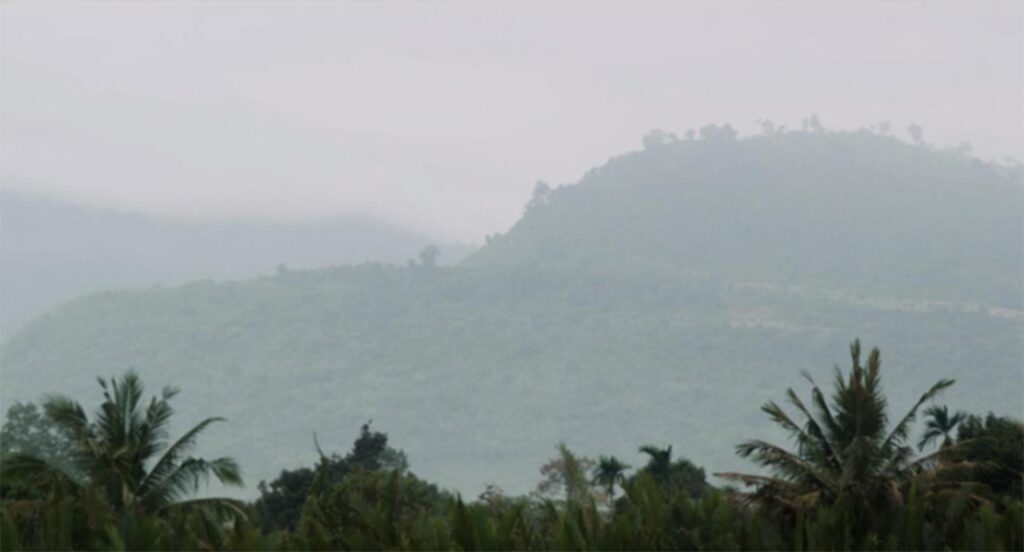
The short film’s title comes from a conversation about the time it takes to form a mountain: Eung wonders if a mountain should be covered in much more forest, if forming it really took a million years. “Don’t you know all the big trees in the forest have been cut down?”, Piseth replies.
Knowing its Cambodian provenance, one may conjecture a reference to the scars left by the Khmer Rouge, a sort of felling of old trees during its Year Zero. Such readings resemble what Fredric Jameson writes about ‘third-world’ film functioning as national allegory. Primed to see cinema in terms of such boundaries, we go about searching for other sources and trying to recognize these links in the filmmaker’s images. Alas, Eung and her friend’s conversation resets itself; the topic shifts to the romantic relationships between each of them and a mutual friend; there is little to be found there. “I was not trying to give any messages, but to express my thoughts about the uncertainty of time, development, love and identity”, director Danech San explains. As though she sees through the potential viewer’s urge to locate, San responds to these expectations with an earnest request to set them aside.
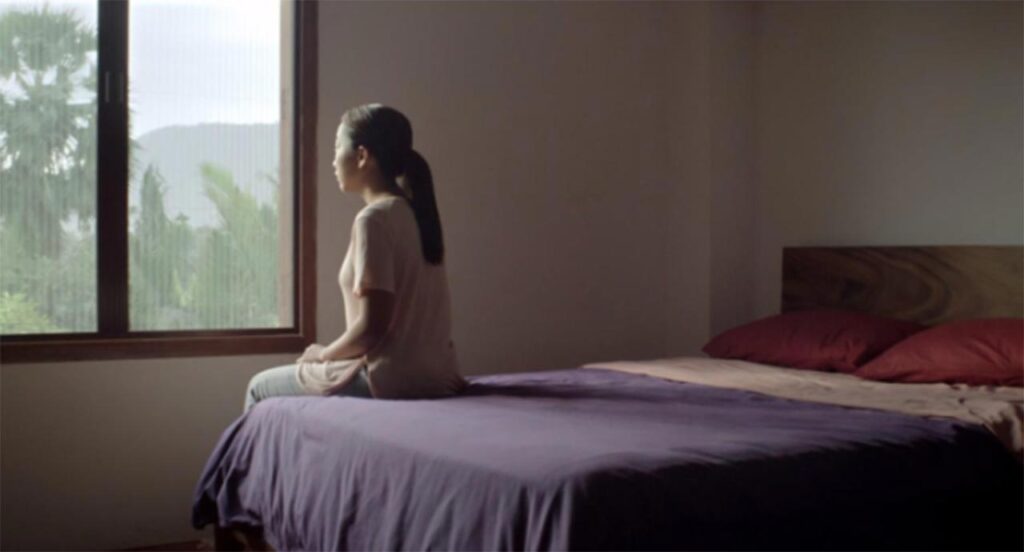
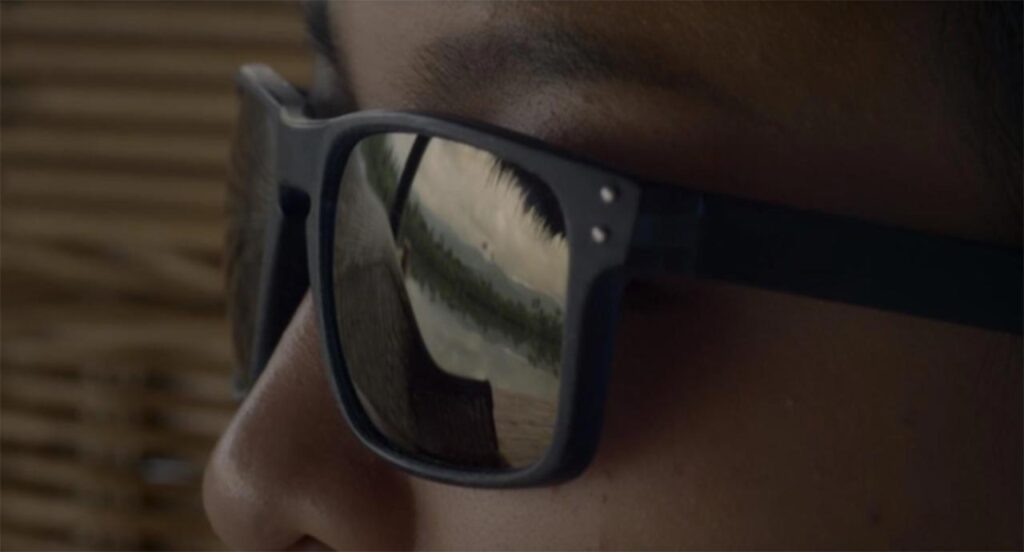
A common notion is that the political, social and economic exists as a wider reality. In contrast to this, personal experiences form abstract encounters: they are incomplete, subjective fragments. Frustrated with the non-directionality of Eung’s emotional space (from the Youth Jury, “Why is he taking photos of her? What’s the deal with the mountain? Is it trying to say something?”), we may be inclined to think of A Million Years as an abstraction, confession, or even autobiography, one that seems deliberately distant from an objective present (compared to say many of the other socio-politically charged short films).
Unearthing the emotional sediments and stratum of A Million Years, San reveals that Eung’s character was developed with her grandmother in mind (she is also named after her). This is despite them having never me; the only memory San could rely on was a single photograph. “I put some parts of myself to the character, some parts from my imagination, and some improvised based on the actress”, clarifies San. With history unretrievable, creating a character then becomes an exercise in activating the present, and subjectivity is refashioned as a textured asset, rather than being a liability for its narrative.
What can we glean from a film which unmoors itself any context, and finds refuge in what San labels “internal feelings”? True enough, A Million Years may seem like a mere state of mind, one that gives little reason for us to empathize with, and may see as a kind of confessional. Can there exist a cinematic truth in someone else’s thoroughly subjective present?
Michelle Citron, writing about women’s autobiographical filmmaking, suggests that personal cinema needs to be distanced from such labels. “The confessional label dismisses autobiographical film as being inappropriate for public display, at best self-indulgent, at worst narcissistic”. I am inclined to agree with her resistance towards these categories, which a personal film like San’s might be siloed into. A Million Years is not an egoistic abstraction about wholly individual experiences. Rather, San intimates with an often-maligned cinema that is centred around the personal: where images are actively negotiated by the subject, rather than the subject being passively inscribed within the cinematic screen.
In this light, an absent relationship with the past does not make A Million Years relegated to the province of the personal, confessional or autobiographical. To me, it is one signature of a personalized brand of storymaking: rather than start with a past context that trickles linearly into the present, it is a puzzle of the present. There is reality to be found by solving it.
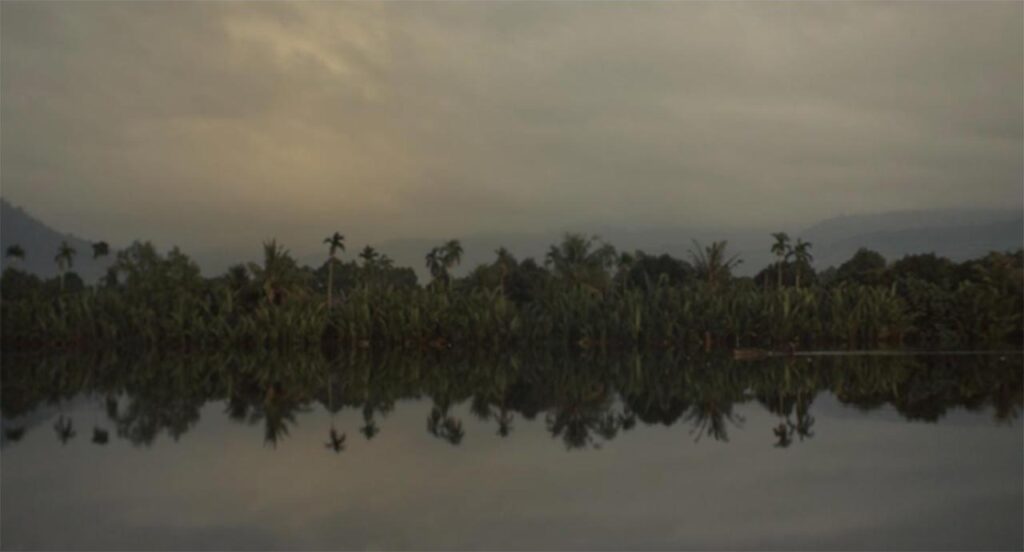
If we think personal films are entirely steeped in unreliable subjectivity, then A Million Years defies this by being particularly inquisitive and reflecting upon its own reality and irreality. San’s riverfront setting, free of any contextual clues, seems to be a perfect dreamscape (think something constructed in Inception). But instead of wholly embracing it as a dreamscape, San emphasizes the tension between the dreamlike and the real. Eung walks into the restaurant, accompanied by her friend who is photographing her at random intervals. She then orders from a waiter at the restaurant. “Did you see that guy?” she asks Piseth when he catches up with her. “No”
Conventional storytelling logic, where the onscreen subject like Eung is also the object of our reading (searching), would suggest that her friend belongs to her reality while the waiter is an imagined being. But who is to say that the converse is not true – is it because her friend is holding onto a camera? What makes someone holding a camera more real than someone who does not? Eung’s desultory conversation with her friend reveals more falsehoods than it reveals truths: Eung sees what her friend does not, they have parallel ideas of the flow of time, incongruous memories of another mutual friend they are romantically entangled with. Given these, how much reality do they truly share? Contrast this with the waiter, with whom Eung recounts her personal experiences. Who is to say these personal elements necessarily belong to the abstract or the unreal?

When asked about how specific her film’s settings are, San tells us “each setting was created based on [her] own experiences”. It is little wonder that so many of San’s shots feel precise and hand-sketched: the sway of an armchair, the paddling of a kayak and the rippling of water all seem to gently caress a deeper memory within the individual. Whether this memory belongs to San or Eung is ours to guess (“It’s very personal!” is all San lets on) , but either way these wispy recounts are all A Million Years needs to keep it going – no further contexts required. Instead of seeing personal history as the receiving end of a cause-and-effect or the downstream of wider structures, San’s account focuses on the unique here and now: something larger than the summation of past memories. Rather than uncontroversially accepting the subjectivity of personal experiences, A Million Years is enhanced by its constant negotiation and struggles with states of reality.
When we talk about how the personal is political (a phrase long uprooted from its feminist origins), sometimes we convince ourselves that the personal is merely an image, a mirage of a truer political reality. In other words, to be free from the subjective taint of personal experience, truths and reasonings can be found only by searching upwards and locating wider political, economic and social contexts. These lenses are undoubtedly still relevant, and wider structures will find ways to trickle down onto lived experiences. San stages a return to “internal feelings” as a kind of local, micro-reality, which in her view are as equally deserving of cinematic attention as the grander ones.
A Million Years is San’s debut short film and her cinematic sensibilities may be only fledgling. It seems possible that she may take on more overt, public forms of address in future works. For now, A Million Years embraces personal experience as lived, unequivocal truth; it comes to a peaceful rest in the middle ground between inwardness and indulgence, abstraction and reality.
A Million Years was awarded Best Southeast Asian Short Film at the recently concluded 2018 Silver Screen Awards.


